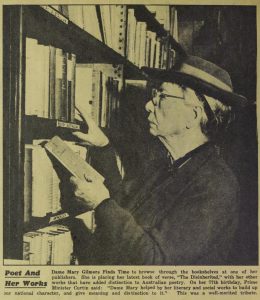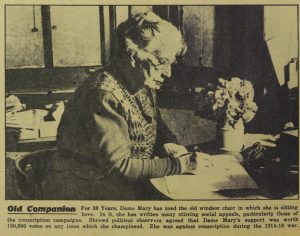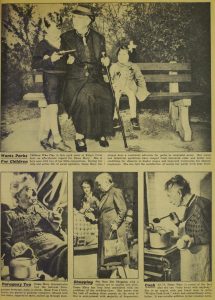[Editor: This article about Mary Gilmore was published in Pix (Sydney, NSW), 24 October 1942.]
Dame Mary Gilmore
Poet’s lifetime of social reform
Dame Mary Gilmore, 77-year-old poet and social reformer, has made a lasting contribution to the cultural and national development of Australia. Her crowded life has been one of splendid achievement. These are its highlights:
A childhood spent in the bush with pioneering parents; as a young woman, school teaching and writing verse, the ardor of which expressed the high hopes of the working class at the birth of the Labor movement in the turbulent period of the ’98 strikes; adventuring with William Lane and his New Australians to Patagonia, there to attempt to organise an ill-starred Utopia; marriage, motherhood and the return to Australia; a busy journalistic career, always agitating for social and industrial reforms, many of which Australia is now proud to have on her statute books.
Dame Mary Gilmore is the only Australian woman to be awarded the DBE (Dame of Order of British Empire) for literature.
Pioneer family
These are hours a of a life which men may envy. Born at Goulburn (NSW) in 1865 of parents who carved a home for their family from the Australian bush, Mary Gilmore developed a love of nature which has remained her inspiration. But she also saw the cruel side of pioneering life; heard the story from her people of the days when the “gentry” had a “kangaroo hunt” — but the quarry was terror-stricken blacks, shot or bludgeoned to death. Some of her finest work has been the consistent advocacy of humanitarian treatment for the aborigines.
While school teaching, Mary Gilmore contributed to the “Worker,” Labor paper of which she was later to edit a section for 23 years. In 1895, she joined William Lane and his enthusiasts who had accepted 25,000 acres of tax-free land from the Patagonian Government on which to build “New Australia.” The failure of the Utopian enterprise is now history.
Mary Gilmore remained for five years, later went to Argentina, wrote for Buenos Aires papers. She married William Gilmore, returning with him and their son to Australia in 1902. For a number of years, domesticity claimed her.
Cookery Book
In 1908, she returned to journalism and political affairs. She quickly made herself felt in the arena of social reform. Nevertheless, she found time to compile one of the most widely distributed cookery books published in Australia, of which Monty Grover, noted Australian journalist, has said: “Mary Gilmore has pleased thousands with her poetry — and comforted the stomachs of tens of thousands with her cookery book.”
Notwithstanding her many public interests, Dame Mary has retained a retiring disposition. Many efforts to induce her to stand for Parliament have failed. A seat on the Senate of the Sydney University was also refused. Dame Mary retains the habits of a busy life. She is active 16 hours of the day, a habit which she ascribes to training and making a virtue of necessity.
In her latest work she retains passionate understanding and contact with the problems that are racking the world. Her genius expresses itself, not in a negative artistic escape from life’s battle, but in an inspiring cry to right old wrongs and build a lasting foundation for peace, hope, and security.
Pictures on these pages take you to Dame Mary’s flat at King’s Cross (Sydney) and show the busy, interesting life of one of Australia’s most distinguished literary personalities.
[Editor: The following are the paragraphs of text placed underneath the photos in the article:]
Poet and her works Dame Mary Gilmore finds time to browse through the bookshelves at one of her publishers. She is placing her latest book of verse, “The Disinherited,” with her other works that have added distinction to Australian poetry. On her 77th birthday, Prime Minister Curtin said: “Dame Mary helped by her literary and social works to build up our national character, and give meaning and distinction to it.” This was a well-merited tribute.
Old companion For 30 years, Dame Mary has used the old windsor chair in which she is sitting here. In it, she has written many stirring social appeals, particularly those of the conscription campaigns. Shrewd political observers agreed that Dame Mary’s support was worth 100,000 votes on any issue which she championed. She was against conscription during the 1914-18 war.
Wants parks for children Children who play in this park oasis at King’s Cross have an affectionate regard for Dame Mary. She is here seen with two of her little companions. During her long and active life of social agitation, Dame Mary has always been a consistent advocate for parks in congested areas. Her social and industrial agitations have ranged from increased rates and better hut conditions for shearers to higher wages and improved workrooms for factory employees. She has had the satisfaction of seeing her social work bear fruit.
Paraguay Tea Dame Mary demonstrates how the national Paraguayan beverage, mate, is drunk. Made from a herb, leaves are placed in a globular container, infused with hot water, sugared to taste, and sucked up through the stem.
Shopping She does her shopping with a critical eye to quality and price. Dame Mary has long been associated with the problems of the working-class. She knows that the task of making three pounds do the work of five is ever-present with the majority of housewives.
Cook At 77, Dame Mary is proud of the fact that she can “bake bread with anybody.” She is an expert cook and found time to write “Worker Cook Book,” which had extraordinary circulation. It was a notable addition to her creative work.
Source:
Pix (Sydney, NSW), 24 October 1942, pp. 18-19
Editor’s notes:
The article stated that William Lane and his comrades went to Patagonia; however, they actually went to Paraguay.
1914-18 war = World War One (1914-1918), also known as the Great War, or the First World War
globular = shaped like a globe, ball, or sphere
ill-starred = ill-fated, ill-omened; something or someone who is unlucky or unsuccessful; something or someone who is destined or doomed to fail, or to end up with a negative outcome or a bad fate
New Australia = a settlement of Socialists and Communists in Paraguay, established by William Lane and his supporters in 1893
New Australian = someone who was part of the New Australia settlement in Paraguay (can also refer to someone who migrated to Australia)
Patagonia = a region in southern South America, part of Argentina and Chile
pound = a unit of British-style currency used in Australia, until it was replaced by the dollar in 1966 when decimal currency was introduced in Australia
Utopia = a paradise; an envisioned land or place where social conditions are perfect (including the economy, government, and laws); a negative reference to a scheme or plan for social and/or political improvement (with the implicaton that such a scheme or plan is badly-designed, impractical, or poorly thought-out)
Utopian = someone who believes in, or advocates for, an envisioned Utopia or paradise; a negative reference to someone who advocates for a scheme or plan for social and/or political improvement (with the implicaton that such a scheme or plan is badly-designed, impractical, or poorly thought-out)
William Lane = (1861-1917) journalist, author, and advocate of a utopian Socialism; born in England in 1861; migrated to Australia in 1885; was editor of The Worker (Brisbane) and of The Boomerang (Brisbane); with about 220 supporters, he migrated to Paraguay in 1893, and established a Communist settlement (“New Australia”), then (following a split) he established another settlement (“Cosme”) in 1894; following the failure of Cosme, he migrated to New Zealand in 1899, worked for the New Zealand Herald, and died in Auckland (NZ) in 1917
windsor chair = a wooden chair with a solid seat (often contoured or saddle-shaped), a curved back made up of a number of wooden spindles or rods (connected to a crossbar and the seat), and legs which slant slightly outwards
[Editor: Changed “in arena” to “in the arena”; “placed in globular container” to “placed in a globular container”, “taste, sucked up through the stem” to “taste, and sucked up through the stem”; “with majority of housewives” to “with the majority of housewives”; “It was notable addition” to “It was a notable addition” (it appears that a shortage of space for the placement of text below the photographs meant that the editor of the magazine decided to cut some corners, with regards to grammar).]
[Editor: The original text has been separated into paragraphs.]



Leave a Reply